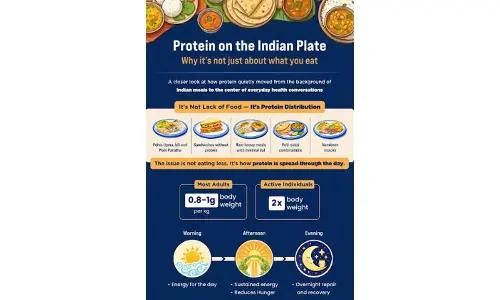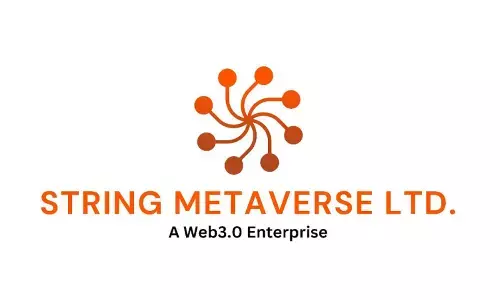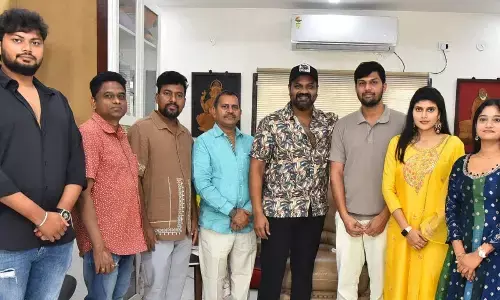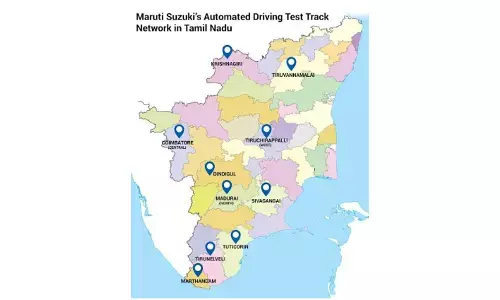Karnataka weavers, artisans strive to survive in lockdown
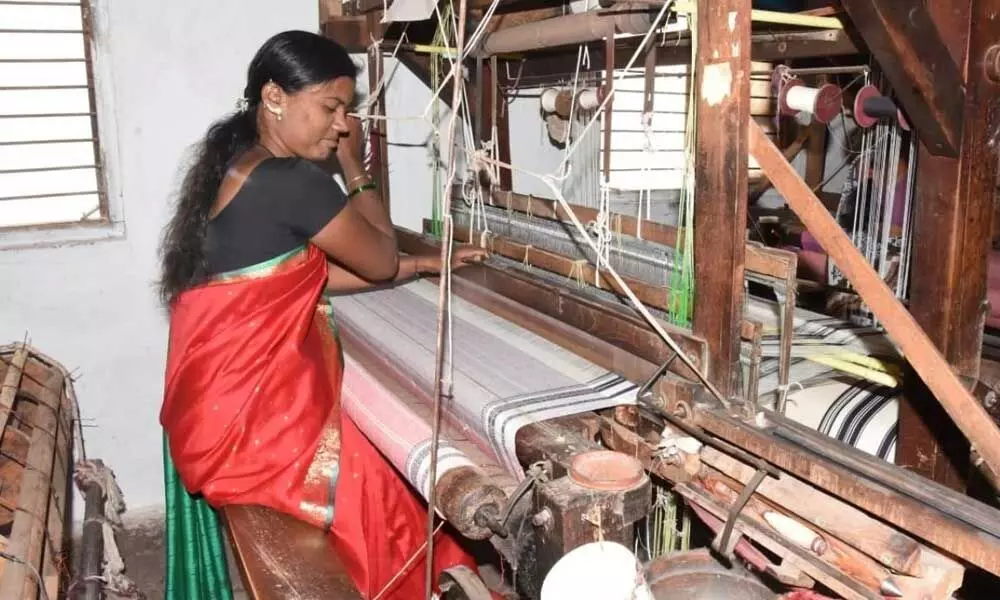 K’taka’s weavers, artisans strive to survive in lockdown
K’taka’s weavers, artisans strive to survive in lockdown“More than people dying of the coronavirus, they will die of suicide (on being) unable to repay their debts and EMIs,” says Ramu’s Facebook post from early April
"More than people dying of the coronavirus, they will die of suicide (on being) unable to repay their debts and EMIs," says Ramu's Facebook post from early April. He went to work at a power-loom factory as a weaver in Doddaballapur, Karnataka. There, the 32-year-old would weave sarees on two looms simultaneously to make Rs 3,000-3,5000 per week. While earning Rs 12,000-14,000 per month, his monthly EMIs amount to Rs 21,000.
Within his monthly earnings, Ramu also has to accommodate the expenses of essentials for his family of four, tend to the needs of his one-and-a-half-year-old son, buy medicine for his ageing mother, and also pay his bills. With expenses exceeding his meagre income, Ramu admits to living what he calls a "rotation jeevana" (rotation life). He borrows money from a bank or a moneylender; unable to repay that loan on time makes him borrow more money at a higher rate of interest from another moneylender, and the circle continues. With the lockdown coming into effect in late March, he says even his 'rotation jeevana' has come to a standstill.
"We may not have a lot of money, but we have our dignity. During this lockdown, even that is being taken away from us," says Ramu. He recounts the time he had to stand under the scorching sun for over two hours, jostling in a crowd that could not social distance, in order to get his monthly ration of three kilograms of rice, one kilogram of sugar, one kilogram of wheat, and a packet of rock salt. Despite the pandemic and the consequent lockdown, he had to pay Rs 55 to purchase these essentials. He said this time, as a measure to ease the burden on below-poverty-line families, the government has given two months' worth of ration instead of one.
Ramu is not alone in his despair. Eight hours north of Doddaballapur is Bagalkot, Santosh's hometown. Like Ramu, Santosh too is 32-year-old and a power-loom weaver. He has six power looms in his house, split three ways between him and his two elder brothers that they have rented from a person he calls 'maalik'.
For the last two decades, Santosh and his brothers have been weaving 6.2 metre-long sarees, selling them back to their maalik at Rs 88 each. Santosh weaves nearly 40 sarees every week, earning a little more than Rs 14,000 per month, much like Ramu. With the money he and his brothers earn, they have to buy the essentials for their family of 13, pay rent to their loom-owner, foot their electricity bill, and also pay the person who spins the yarn and starches their fabric. With the whole family losing their income, Santosh and his brothers struggle to fulfil their daily needs. When asked about relief from the government, he says he was given only rice and wheat for free. "But how can one survive on just plain rice and wheat?" he asks.
On 14 May 2020, Karnataka Chief Minister BS Yediyurappa announced a relief package of Rs 162 crore for vegetable and fruit farmers and power-loom weavers, who are in financial distress because of the Covid-19-induced lockdown. As per the package, each power-loom weaver will receive Rs 2,000 as a one-time relief aid. While it may seem like the problem with the package is that the amount provided is seven times lesser than the weavers' average income, the true shortcomings of the relief package go beyond that. "For us to get this loan, we must show our SSLC certificate, weavers' card, and should also be a part of a weavers' society. Only people with all this have gotten loans and power bill subsidy in the past," Ramu informs. Having studied only till Class Six, he is not eligible for relief from this government package.
"Getting a weavers' card is such a hassle," says Manjunath, Ramu's friend and co-worker. "First, we have to pay them Rs 500 for registration. After that, they will train us in weaving for 15 days at a government-run facility. If we successfully complete that, only then will we be given a weaver's card." "We have been weaving since our grandfathers' days, and yet they think we are weavers only if we pass their government training," Ramu chimes in.
Founded in 2018, Shrenis is a Bengaluru-based organisation that works with artisans across South India. They collaborate with weavers, toy makers, beauticians, carpenters and other artisans. Shrenis provides these artisans with networking opportunities and information on their basic rights. They aim to empower artisans, enabling them to earn fair prices on their labour, while reducing the massive profits made by middlemen at the cost of these artisans.
Since the lockdown began, many artisans who work with Shrenis have been facing severe financial setbacks. To help ease the burden on them, Shrenis started a relief fund. "We give each artisan a basic sum of Rs 1,000 to take care of their most urgent needs," informs Sumathi, community co-ordinator at Shrenis. Their initial goal was to raise Rs 15 lakhs and give 500 families Rs 3000 each. But so far, they have only been able to raise Rs 2.5 lakhs, and since many artisans are still in dire need of help, they are disbursing Rs 1,000 to each family. They hope to raise enough funds to provide all 500 families with at least Rs 1,000.
"We didn't want to give them ration/essential kits since we wanted to maintain social distancing, and travelling in this current situation is difficult. Also, we do not know which artisan needs money for what. Some may need it for medicines, while others may need it to buy essentials. Hence, we directly transfer the amount to their bank accounts," she adds.
To help raise funds, Shrenis has identified community leaders who interact with artisans from their communities, and gather information about them. These leaders shoot videos of the artisans, who speak about their troubles with the hope that getting a peek into their difficult lives under lockdown will encourage more people to donate. Santosh, who has been gathering information and making videos in Bagalkot, has refused to take monetary help from Shrenis yet. "How can I take (money) when I'm helping others?" he asks. "I don't have the strength to help them physically, but at least I can help them this way," he adds. In May 2019, Ramu received Rs 1,000 from Shrenis. "We don't know how they look or who they are, but in a dire time like this, when we are not receiving help from the government also, Sumathi and Shrenis helped me so much. Once this lockdown ends, I will buy a bus pass and come to Bengaluru to thank them," the weaver says, with a hint of conviction. While Ramu is among the 251 who received help, Nooruddin is among the remaining 249 who are yet to receive help. The latter is a toymaker from Channapatna in Karnataka. Having been in the profession for the past 30 years, he says he cannot switch to any other job at this time to fend for his family of six. He was offered relief money from the organisation, but decided to pass it on to a co-worker with a physical disability. Despite relaxed lockdown measures, Nooruddin knows it will take him anywhere between six months and a year to get back up on his feet. "People don't have money to buy essentials, why will they buy toys?" he asks. With aged parents and young children to look after, he is anxious about taking care of his dependents. When asked about his most urgent need, Nooruddin earnestly replies, "If I get some food, that itself will be enough."
(This article was first published on www.firstpost.com. Reprinted with their permission)




